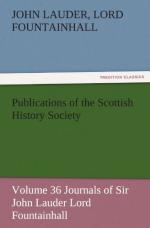In anno 1670, Mr. Alexander Spotswood, plaiding in the Oriminall Court for Wedderburne, and Mr. Patrick Home, being his antagonist and growing hot, called Alexander a knave, who replied, I can sooner prove you and your father knaves, who theirupon was imprisoned; but at last, upon intercession of freinds, was set at libertie. The Justice Clerk[599] was verie inexorable in the particular.
[599] Lord Renton.
In June 1670, Douglas of Kelheid, younger, affronted Hew Wallace, Writer to the Signet, in his oune house; which the Faculty, apprehending themselfes concerned in, at last caused Kelheid, in presence of them all, crave Hew and all the Faculty pardon for his offence, and confesse they did him a great courtesie in accepting that for satisfaction.
On the end of January 1671, Sir John Gilmour, by reason of his infirmity, having dimitted his place of being President, but strongly having recommended Gosfoord to be his successor, it was offered to Sir John Nisbet, King’s Advocat (whosse place if he had embraced it was thought Sir Robert Sinclair would have got), who faintly refusing, thinking theirby to have bein more woed, he was taken at his word, and our Jock of bread Scotland[600] would take none of their advices, but would take a way of his oune, and so did make choise of my Lord Stair, who was looking litle for it, and who truely came in betuixt tuo, and was so unacceptable to the former President that its thought he would not have dimitted had he dreamed the guise should have gone so; and the pitching on him was truely in odium tertii to keip of Sir Robert Sinclar, whosse journey to Scotland under the pretence of coming to sie his new maried ladie suffered strange constructions at Court, and Lauderdale conjectured it was only to give my Lord Tueddale notice of some things that was then doing to his prejudice; and its beleived he would not have bein the coy duck to the rest of the Advocats for their obtempering to the Act of Regulations[60l] had he forsein that they would have hudibrased[602] him in the manner they did; hence we said give us all assurance to be Kings Advocat and we shall take it with the first; and the Lords, when he was plaiding before them in a particular, entreated him to come within the bar and put on his hat, since it was but to make him Advocat with 2 or 3 days antidate. He took also with it,[603] and did not deny it when he was posed on it.
[600] Jock of bread (broad) Scotland, Lauderdale.
[601] The Advocates objected
to an article fixing their fees in the
Regulations
for the Court of Session, drawn up by a Commission
and
ratified
by the king. Sinclair, Dean of Faculty, expecting
preferment,
instead of championing the bar, was the first to swear
to
the Regulations. The Advocates withdrew from practice
for two
months,
and never forgave the Dean. See p. 222.
[602] A participle coined
on the same principle as the modern
‘boycotted.’
The point of the comparison with the hero of Butler’s
satire
is not obvious. It seems to mean simply ‘made
a fool of.’




